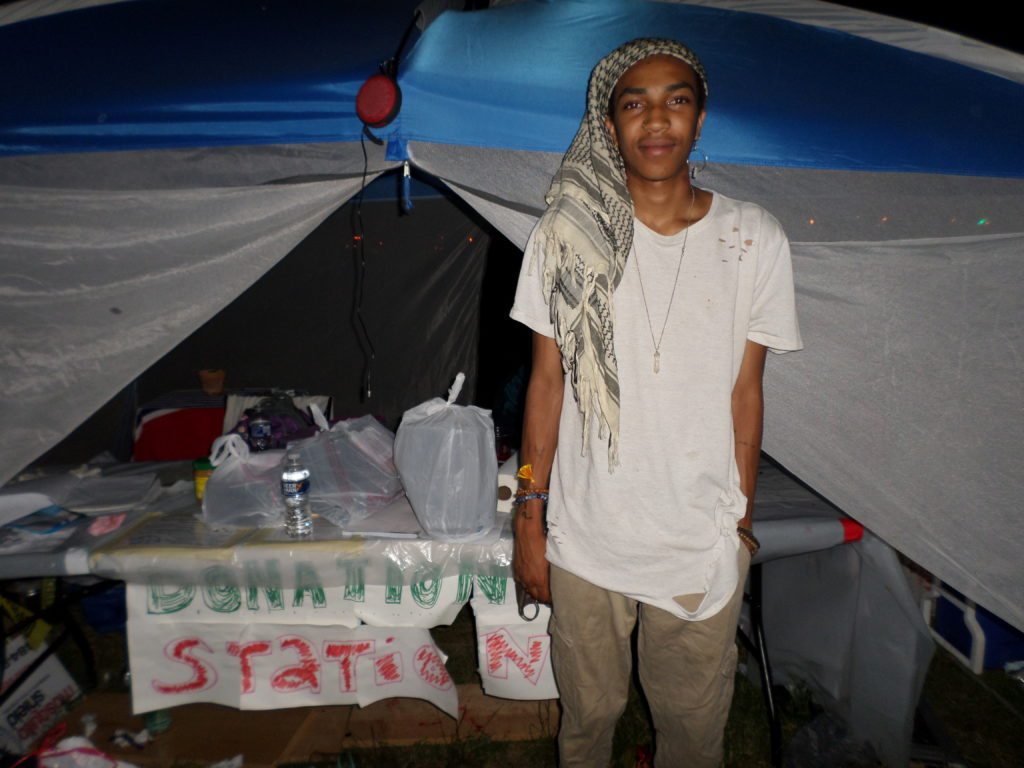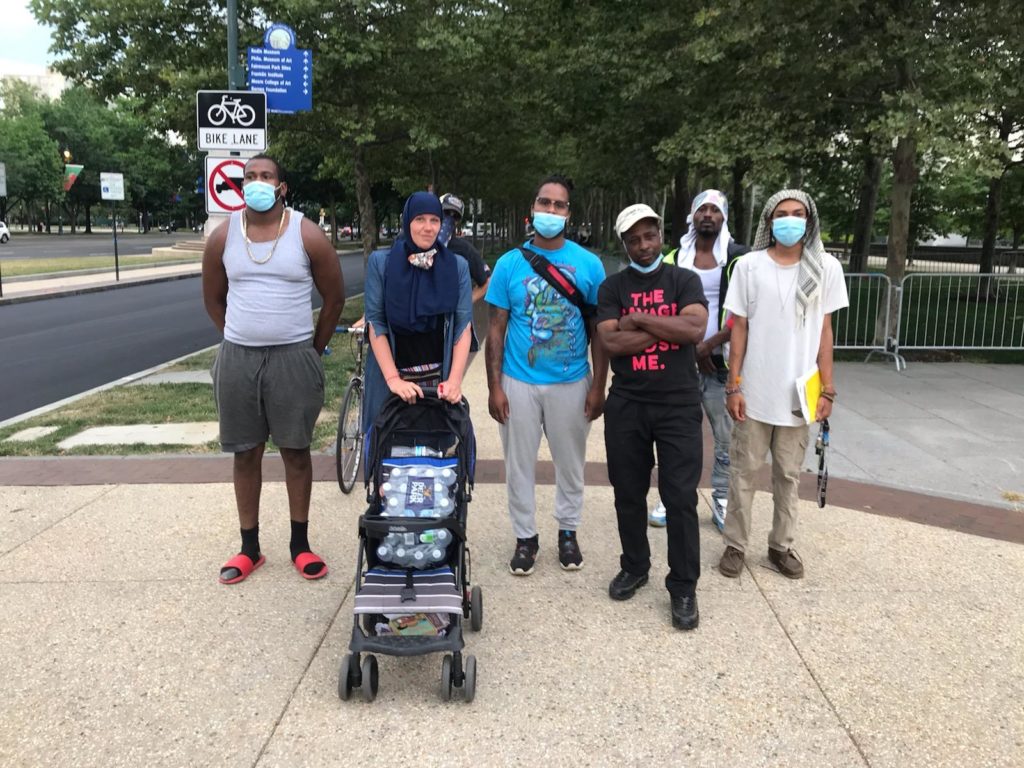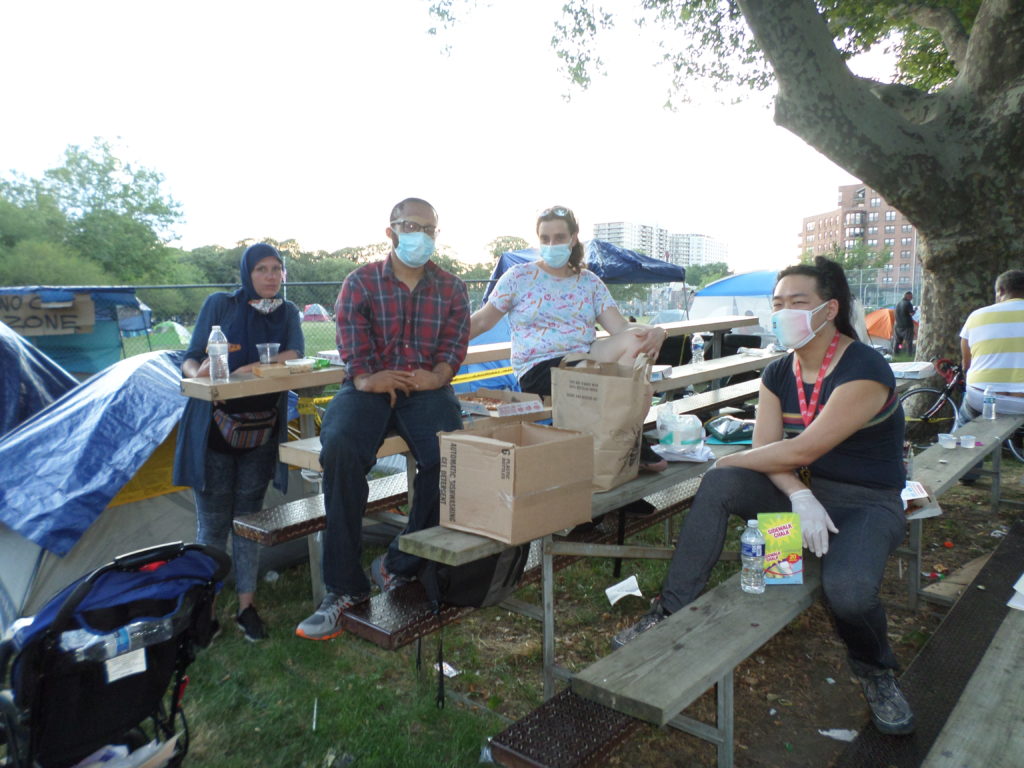This is the view from within the encampment on the Parkway
 July 10, 2020
Category: Featured, Long, Purpose
July 10, 2020
Category: Featured, Long, Purpose
Editor’s note: City officials announced July 10 that they will close the encampment by next Friday.
They have demands.
“One that I care deeply about is the push to end the ‘service days’ and homeless sweeps around the city,” said Indigo, a 20-year-old housing activist and Temple University student. who lives at the 200+ tent camp at Von Colln field on the Benjamin Franklin Parkway.
Inspired by the Black Lives Matter uprisings that coalesced across the nation after the deaths of George Floyd and Breonna Taylor, people experiencing homelessness and their allies in the Workers Revolutionary Collective and Occupy PHA took control of field on the Parkway June 11 and have named it an autonomous, police-free zone.
For many of the city’s residents experiencing homelessness, Indigo tells me, safety is predicated on whether they can avoid being “helped” by the Philadelphia Police Department or Office of Homeless Services.
Such assistance, offered under the guise of service days by city officials, results in the “eviction” of hundreds of unhoused Philadelphians from local public spaces. Six such service days have taken place in 2020.
“It really is like taking people’s things, throwing them in the trash and then rendering them once again, homeless without any other options, any place to go or to sleep or anything,” Indigo said,
The director of the Office of Homeless Services disagrees wholly with that characterization.
“Service Days combine the offer of treatment and housing with cleanups of areas where people are living on the street,” Liz Hersh said. “People are not “evicted” – they are allowed to return after the site is cleaned.”
The city does not criminalize homelessness, she said, rather it tries to maintain the health and safety of the outdoor areas where unsheltered and unhoused persons congregate. She said the Office has had to deal with rat infestations, used syringes, and human waste at the encampments that have been cleaned out, adding that a Hepatitis A outbreak last year was caused by the squalid conditions.
“We try to minimize the negative impact of the clean-ups by giving people 72 hours notice and by using the opportunity to offer services,” Hersh added. “We also distribute trash bags so people can do their own clean up.”
But many of those living in the James Talib-Dean Camp — christened after the recently deceased cofounder of the WRC who for years fought for housing rights in the area — believe that city officials place the wants of corporate bankrollers and neighborhood t-ball leagues above the needs of vulnerable people searching for sustainable housing.
They point to the list of demands the residents of the camp hope the city will accede to before they agree to leave the camp. They include that public property stop being sold to private developers, that camping ordinances within city limits be repealed, and that City support self-sufficient tiny houses not funded by capitalist entities.
Several activists returning from a tense meeting with city officials last Friday stated that the Mayor’s office wouldn’t budge on meeting protesters’ demands.
The city claims that they have no authority over the PHA, they told me, and that despite thousands of abandoned houses in Philadelphia, there are no housing options to meet the needs of camp residents.
“The city of Philadelphia, specifically the Philadelphia Housing Authority, which is funded by our government taxes, they have thousands of empty homes,” said Alex Stewart, cofounder of the WRC. “They act like a private developer. They sell public housing stock to developers and are the catalyst for gentrification in Philadelphia.”
In response to PHA’s actions and the City’s inaction, activists have taken the fight to the PHA’s headquarters to pressure the city.
The news that the meeting with the City was unproductive didn’t come as a surprise to camp residents and organizers.
The activists told me that for the past six months they, and the people experiencing homelessness they support, have fought to be heard. They claim they’ve been ignored by Hersh, have watched as quarantine hotels sat empty, and have been aghast that the City has reneged on promises to test people going into shelters.
Hersh disputes that narrative and says that the City has tried to work with organizers and camp residents since the camp was first established.
“In our first response, we offered to support a tiny home village, rooms in a COVID preventive housing (hotel) for those who are particularly vulnerable should they contract COVID, and expressed our openness to a sanctioned encampment, a positive response to several of their main requests,” Hersh said.
“We have been in close communication with them throughout via email, phone and in-person visits. We met with organizers and residents for two-and-a-half hours on June 19 and have continued to be in touch since then.”
Further, she said that the City has since housed more than a dozen camp residents who are at risk for COVID, stating that officials have also agreed to housing plans, a Homeless Connect event, and outside observers.
“Testing for COVID is widely available,” she said. “Camp organizers brought a Federally Qualified Health Center in to test anyone who wanted it. We were supportive of that and willing to place anyone who was positive in the Quarantine and Isolation site.”
Residents pick camp over shelter
In the hierarchy of needs, sustainable, long-term housing ranks high above sleeping on the street, but the safety and security of Camp James Talib-Dean makes it rank higher than a city-sanctioned shelter, according to some of the residents of the camp.
Plus, Living outside allows them a sense of self-autonomy and control that’s lost in the shelter system.
“I looked for shelters as I was told, I didn’t know what else to do,” Khaleem, an unhoused Philadelphian living at the camp told me.
Khaleem bounced around the Department of Human Services foster care system before aging out when he turned 21. Like others in his position, he said, the City gave him information about a shelter and little else.
“I’ve been through a lot of placements,” he continued. “I feel more comfortable outside and far safer and stuff like that, simply because of the structure of the shelter — the rules, the regulations, the time, the way that people are so put together … it really messes with my PTSD.”
According to some explainer literature put out by the camp’s organizers, people experiencing homelessness can have difficulties residing in shelters because they are confining and restrictive, inhibiting unhoused people’s freedom to come and go as they please, and making them feel like they are in a prison.
Additionally, strict lifestyle controls imposed by shelters, including curfews and restrictions on sexual activity, make them an undesirable option for many.
With its library, medic station, and donation area, the camp feels like a community.
Paul, a local pastor, spent the evening I was there doing rounds and learning every resident’s name. A large screen was set up near the baseball field, ready to play a film about squatters. And on the benches that line the Parkway, residents came together to talk, share a cigarette, or look at the night sky.
Cheryl, an elderly Black woman who struggled to stand, laid down in the grass as organizers set up her tent. She read the Bible as her partner, Timothy, brought their bags — one-by-one — from the entrance of the camp. Psalm 23 is her favorite, she told me.
“You prepare a table before me in the presence of my enemies,” she read aloud. “You anoint my head with oil; my cup overflows. Surely your goodness and love will follow me all the days of my life, and I will dwell in the house of the Lord forever.”
Stewart said that every resident at the camp plays a role in the progress of the encampment. “We’re moving towards self-reliance and moving away from the city who has allowed the homeless problem to manifest to where it is.”
Resistance and counter-resistance
In the June 17 edition of the Philadelphia Inquirer, Marsha Cohen, executive director of the Homeless Advocacy Project, a nonprofit in the city that provides legal services to people experiencing homelessness, called the tent camp protest on the Parkway “irresponsible” and “stupid.” She referred to the residents there as “political pawns,” telling the Inquirer that the Black Lives Matter-inspired demonstration was “insane” in light of COVID-19.
Five days later, Cohen issued an apology through HAP. “I regret the clumsy ways in which I tried to express my concerns for the health and welfare of the homeless individuals within the encampment,” Cohen wrote. “In my efforts to prioritize their wellbeing, I trivialized the objectives of the organizers as well as their support for the Black Lives Matter movement and bringing awareness to our city’s homelessness issue.”
Racial justice is part of the movement to secure people sustainable housing in the city, which is why the encampment-as-protest is inextricably intertwined with the Black Lives Matter movement, said the camp’s organizers.
Out of almost 17,000 people who came in contact with the Office of Homeless Services in 2018, nearly 14,000 were Black or African American. Black residents accounted for 45 percent of all COVID-19 cases in Philadelphia at the end of May, and statistics show that Black communities in the city overwhelmingly fall prey to over-policing, for everything from curfew violations to marijuana use. It’s the perfect storm of issues that place Philadelphia’s homeless population at the center of an explosive public health and social justice crisis.
Addressing Cohen’s concerns, Sterling Johnson, a local housing activist who has been helping the camp and negotiating with the City, said that “national and international researchers have visited the encampments and found them to be relatively safe compared to congregate indoor shelters which have been deadly for many.”
“So far we have had only one positive COVID [case],” he explained, “and were able to support that person in the appropriate manner.”
The camp isn’t popular with people from the neighborhood, however, who have come together to petition the city to end the encampment.
The Friday evening I was there, two white gentlemen approached the entrance of the camp and attempted to remove its temporary signs from Von Colin Field’s permanent marker. The men were upset that the encampment had encroached upon the field, and their children wouldn’t be able to play t-ball later in the summer. They turned verbally combative and argued with the camp residents.
“For the children. To play. Ball,” one of the white men said in a slow, staccato voice after his partner finished explaining to the crowd that they had been in the neighborhood for 15 to 20 years. “And now they can’t play ball.”
Organizers, who tried to explain the plight of the city’s homeless, were dismissed.
“They’re just kids,” said one of the men. “They just want to play ball.”
To many of the residents of the camp, the exchange was proof that white privilege outweighs Black suffering.
As Indigo said later that evening, the camp will always have to be mindful of issues that arise, whether it’s stealing things or trying to take down signs. According to them, success means coming up with a concise agreement on how to handle these things.
“I’m reading Assata, her biography,” Indigo said, ”and in the opening, Angela Davis talks about [how] in recreating a society without police we have to make sure that we don’t become police ourselves.”
That philosophy is in evidence in the organizers’ statements about a stabbing that took place in the camp in late June — the only incident of its kind that has erupted in the large encampment to date.
“One of the consequences of systemic racism are disputes that can erupt in violence due to a lack of resources and opportunity,” Johnson said. “We support defunding the police and investing in neighborhoods. That is what will reduce violence in our communities.”
Johnson and other organizers point to the fact that the media has paid far more attention to the one incidence of violence than to the bigger issues the camp seeks to draw attention to, as part of a frustrating pattern that makes the encampment necessary.
“Usually, when a person’s got nothing to lose, he takes what he wants,” said Archie, another housing activist at the camp. “The only way he thinks of living is in survival mode.”
“The City is giving us nothing for the homeless,” he said.
Project
Office of Homeless ServicesTrending News












